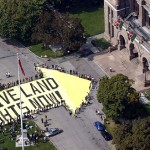Supreme Court will hear Grassy Narrows’ legal case for Treaty rights and against clearcut logging
 Today the Supreme Court of Canada granted leave to Grassy Narrows to appeal their legal action for Treaty rights and against clearcut logging to the highest court. The case challenges Ontario's jurisdiction to award logging and mining licenses on a vast tract of Treaty 3 lands north of the English River (the Keewatin Lands).
Today the Supreme Court of Canada granted leave to Grassy Narrows to appeal their legal action for Treaty rights and against clearcut logging to the highest court. The case challenges Ontario's jurisdiction to award logging and mining licenses on a vast tract of Treaty 3 lands north of the English River (the Keewatin Lands).
- Supreme Court to hear Grassy Narrows’ challenge over logging. Globe and Mail, September 19, 2013
- Grassy headed to Supreme Court. Kendra Online, September 20, 2013
-
Supreme Court to hear Grassy Narrows appeal on logging dispute
Kenoral Daily Miner and New, September 20, 2013 -
Grassy Narrows lawyer explains Supreme Court argument
Kenora Daily MIner and News, September 24, 2013 -
Keewatin appeal could limit provinces’ access to treaty lands
Tory Media, October 3, 2013
IMMEDIATE RELEASE Thursday Sept. 19, 2013
Supreme Court will hear Grassy Narrows' legal case for Treaty rights and against clearcut logging
ON makes new plans for industrial clearcut logging at Grassy Narrows
Ottawa – Today the Supreme Court of Canada granted leave to Grassy Narrows to appeal their legal action for Treaty rights and against clearcut logging to the highest court. The case challenges Ontario's jurisdiction to award logging and mining licenses on a vast tract of Treaty 3 lands north of the English River (the Keewatin Lands). The case, called Keewatin v. MNR, has been winding its way through the courts for fourteen years.
However, Ontario continues to plan for clearcut logging throughout Grassy Narrows Territory and is currently seeking input on a new 10 year Forest Management Plan for Grassy Narrows Territory that includes many dozens of large clearcuts against Grassy Narrows' will. The new plan is scheduled to take effect in April 2014.
"This decision is further proof that our concerns are valid and important," said Joseph Fobister, one of the Grassy Narrows trappers who initiated the legal action. "It is sad that Ontario continues to ignore us when we tell them that clearcut logging hurts our people."
Scientific studies indicate that clearcut logging in boreal watersheds raises mercury levels in fish above the Health Canada limit for safe human consumption. Recent clearcut logging in Grassy Narrows territory has exacerbated and prolonged the terrible health impacts of mercury poison that began when a paper mill upstream in Dryden dumped 20,000 pounds of mercury into Grassy Narrows' river between 1962 and 1970.
“Our community has suffered for too long from the impacts of industry imposed on our people,” said Joseph Fobister. “We cannot allow industry to further damage our way of life and our health by poisoning our water and destroying the forests that we depend on.”
In her 2011 ruling in favour of Grassy Narrows Ontario Superior Court Justice Sanderson had harsh words for Ontario’s approach to Treaty rights: “Ontario's approach to this litigation, while pleasantly civil, was strongly adversarial. Always focusing on its own proprietary rights, it downplayed the plain and clear reference in the Harvesting Clause to Canada. It characterized as a "mistake" what I have found to be [the Treaty Commissioner’s] deliberate attempt to protect the Harvesting Rights of the Ojibway…” [1603]
On March 18, 2013 The Ontario Court of Appeal overturned Justice Sanderson's ruling. The legal matter will now be decided at the Supreme Court of Canada.
In June, a wide range of human rights, faith, labour and environmental organizations representing over one million Ontarians wrote to the Premier urging her to call an end to unwanted logging permits on Grassy Narrows lands. Premier Wynne has not responded.
Contact:
|
Chief Simon Fobister: 807-407-0170 Joseph Fobister: 807-407-2745 |
Robert Janes: 250.888.5269 rjanes@ jfklaw.ca |
Background on Keewatin v. MNR can be found here:




